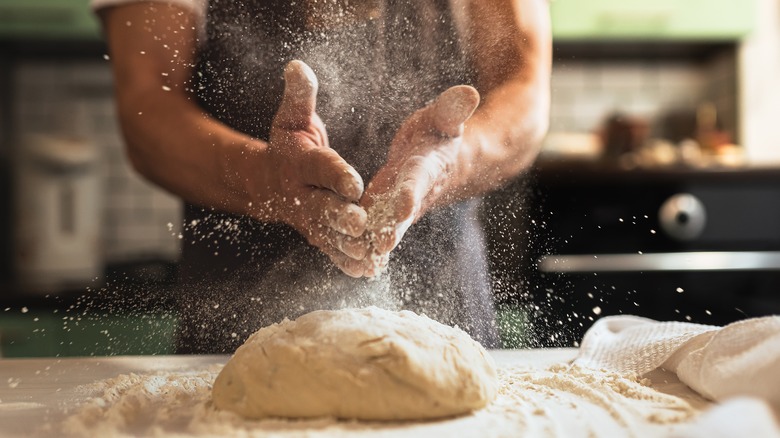Bobby Flay's Pro-Trick For Fresh Pasta In Under A Minute
Bobby Flay is no stranger to whipping up incredible meals in a limited amount of time. When the chef faces off with contestants on "Beat Bobby Flay," that's exactly what he has to do. So, over the years, it makes sense that he's developed a few different tips and tricks that allow him to speed up the cooking process while still creating a high-quality dish. And he's not afraid to share those tips with all the cooks at home trying to fast-track weeknight dinners.
When it comes to quick meals, pasta is often at the top of home cooks' lists; it's relatively easy to whip up a delectable pasta dish in a few minutes flat. However, if you've been using dried pasta because you think fresh pasta takes way too long to make, Flay has a trick you'll want to try.
Food Network shared a clip on Twitter in which Flay created a pasta dish using fresh pasta that he'd just made. Now, if you're pressed for time, fresh pasta can actually be preferable to dried pasta because it cooks in about half the time, as Paesana explains. For most home cooks, the issue is just in how long it takes to make the dough. As Flay explained, all you need to do to fast-track that process is to grab a commonly used kitchen appliance that you may not have thought to use for this purpose.
Let your food processor help
As the Twitter clip demonstrated, Bobby Flay grabbed a food processor and added the same ingredients he would to make fresh pasta dough by hand: flour, eggs, and egg yolks. Then, rather than kneading it by hand until it's perfectly combined — something he estimates takes about 10 to 15 minutes — he simply blitzed the ingredients in the food processor until a dough was formed. His tip couldn't be simpler, and it allows you to go from raw ingredients to a ball of pasta dough in less than a minute.
Then, Flay kneads the food processor-crafted dough for just a few seconds before it's ready to put through a pasta roller, shaving a ton of time off the process. One caveat is that he does suggest allowing the dough to rest for 10 to 15 minutes to help the gluten develop. As Food52 explains, you don't want to skip this step; the outlet recommend resting your dough for at least 30 minutes.
However, the resting step is passive time in which you can be doing other things in the kitchen. For example, you might use the time the dough is resting to gather anything you need to whip up a quick sauce. That way, once your dough is rested, rolled, and quickly cooked, you'll be able to plate your meal in no time at all.

